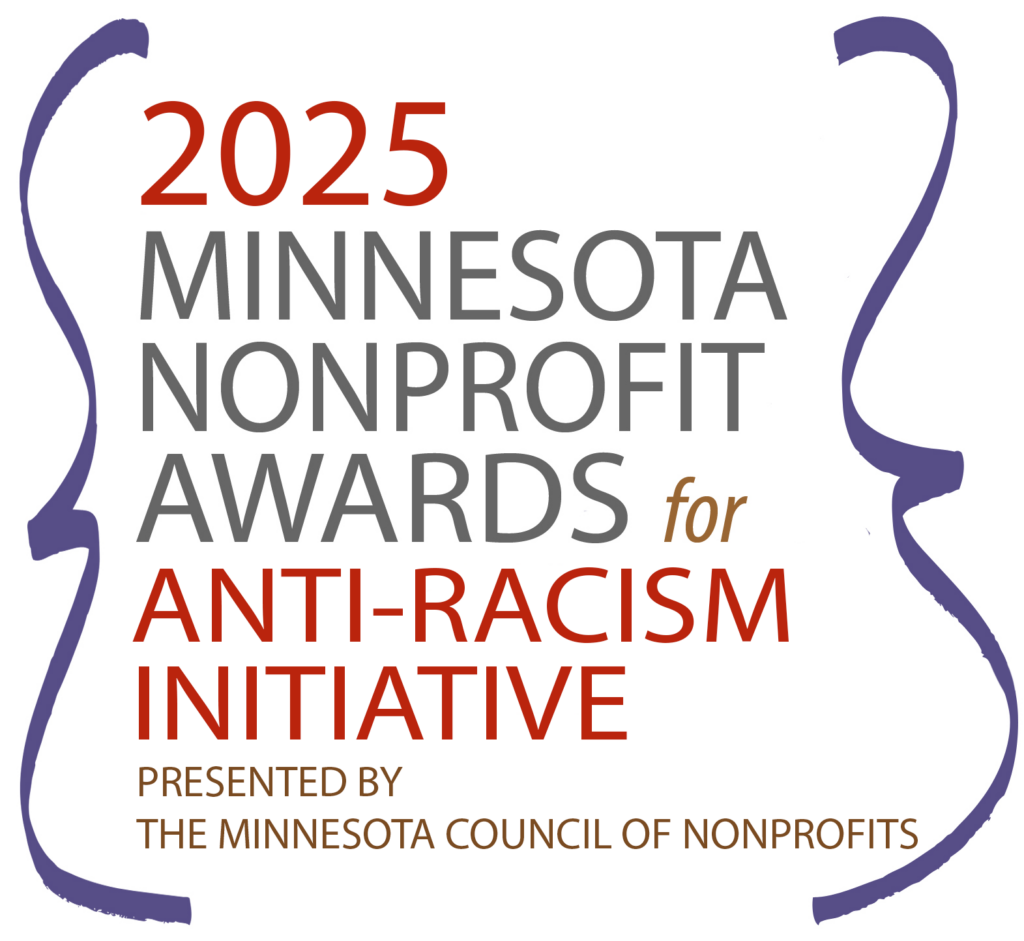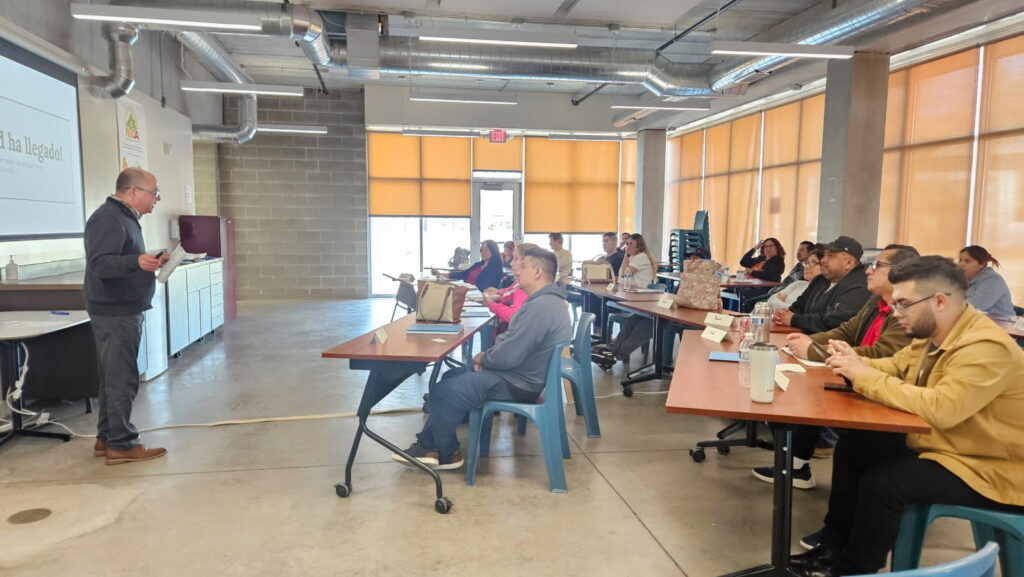
The Mission Award for Anti-Racism Initiative recognizes an organization that actively engages audiences in anti-racism activities. Nominated organizations should:
- Work to eliminate prejudice and racism in society;
- Demonstrate a commitment to pluralism and inclusivity; and
- Develop unique and thought-provoking strategies to combat racism.
Voting for the 2025 Minnesota Nonprofit Mission Awards has officially closed. Thank you for participating!
2025 Anti-Racism Initiative Finalists:
Neighborhood Development Alliance | Voices for Racial Justice | Young Hearts Open Minds

Neighborhood Development Alliance
Neighborhood Development Alliance (NeDA) is a nonprofit committed to closing the racial homeownership gap and fostering financial empowerment in underserved communities. The organization’s mission is to build economic mobility by providing culturally responsive financial education, housing counseling, and access to affordable homeownership opportunities.
For decades, systemic discrimination has excluded communities of color from homeownership, a key driver of generational wealth. Minnesota has one of the nation’s largest racial homeownership gaps, disproportionately impacting Latino, Black, and immigrant families.
Serving low- to moderate-income BIPOC households, including Latino, Black, and immigrant families, as well as seniors, NeDA confronts this inequity head-on with a holistic approach that empowers individuals through knowledge, advocacy, and opportunity. The organization is dedicated to dismantling systemic barriers to homeownership and financial stability for BIPOC communities. Through their culturally responsive programs, they directly address racial disparities in housing by equipping families with financial education, homebuyer counseling, and access to equitable lending.
NeDA’s initiatives include HUD-certified homebuyer education, foreclosure prevention counseling, and financial coaching tailored to the unique needs of diverse households. Our lending arm, Centro de Finanzas, is a certified Community Development Financial Institution, ensuring that historically marginalized populations can access fair and affordable mortgage products. Additionally, their real estate development projects increase the supply of entry-level homes, making homeownership attainable for more families.
Beyond direct services, NeDA is a vocal advocate for systemic change. We collaborate with policymakers, community leaders, and partner organizations to influence housing policies that promote equity. By amplifying the voices of those most affected, we challenge discriminatory lending practices and push for long-term solutions to racial disparities in housing.
NeDA’s work is strengthened through strategic collaborations with local and statewide partners committed to closing the racial homeownership gap. Key collaborators include Minnesota Realtors®, the Minnesota Homeownership Center, and Twin Cities Habitat for Humanity, with whom we advance affordable housing solutions through new construction, acquisition, and rehabilitation.
Additionally, NeDA works closely with city and state policymakers to advocate for systemic change, ensuring policies prioritize racial equity in housing.
NeDA’s work has had a profound and measurable impact on Minnesota communities, particularly in closing the racial homeownership gap and advancing financial stability for BIPOC households. As a nonprofit of our size, we estimate serving over 1,000 individuals annually through our homebuyer education, financial coaching, and lending services, aligning with similar community-based organizations. Approximately 70 percent of the households we support are BIPOC, and over 80 percent earn at or below 80 percent of the area’s median income.
The organization’s foreclosure prevention efforts have been instrumental in stabilizing communities. In 2023, 40 households facing financial hardship received foreclosure counseling, with 75 percent successfully avoiding foreclosure and remaining in their homes.
Additionally, NeDA’s real estate development initiatives further address Minnesota’s affordable housing crisis. Through strategic partnerships, we have developed and rehabilitated entry-level homes in the East Metro area, including Bluff Homes, Villa del Sol, The Terraces, and Stryker Senior Housing, representing a $55 million investment in housing equity.
The cumulative impact of NeDA’s work is clear: higher homeownership rates, reduced financial disparities, and stronger, more resilient communities. By addressing the root causes of housing inequities, they are not just creating homeowners; they are transforming lives, stabilizing neighborhoods, and ensuring that families of color have the same opportunities to thrive as their white counterparts.

Voices for Racial Justice
Founded in 1993 to strengthen the field of organizing in Minnesota, Voices for Racial Justice (VRJ) is a fiercely visionary and community-rooted nonprofit that centers the leadership, wisdom, and solutions of Black, Indigenous, and people of color (BIPOC) across the state. They serve thousands of individuals each year, with a statewide reach that prioritizes deep relationships in rural, urban, and Tribal communities.
Through healing justice, cultural organizing, and public policy advocacy, VRJ works to dismantle white supremacy and co-create a world where all communities thrive. The organization’s mission is to build power through collective cultural and political organizing. Their programs — ranging from narrative change and electoral justice to healing circles and grassroots leadership development — emerge directly from community wisdom.
VRJ emphasizes the assets, talents, knowledge, cultures, and traditions of BIPOC communities. One important way they do this is through our Education Equity Parent Fellowship. The organization’s education team provides BIPOC children with the best advocates they could ever hope for: their parents. Parents go through personal leadership development and organizer training to support their children through school, district, and state advocacy for education equity, creating more welcoming and inclusive school environments across the state.
The Centering Community in Policymaking framework and cohort is also a cornerstone of this work, through which VRJ convened a table of ten policy advocates and organizers to reimagine and update the Racial Equity Impact Assessment for the current moment. This updated framework does not have the definitive answers to the pervasive challenges faced in decision-making spaces. It is a tool of accountability and a declaration that those closest to injustice are also closest to the solutions.
Another powerful way VRJ challenges current systems while reimaging new ones grounded in community is through creating our Democracy Toolkit, including a four-week social media guide and a voter engagement guide for use throughout the most recent midterm elections. The content in the toolkit is nonpartisan and intended for 501(c)(3) organizations engaging with BIPOC voters. The tools were used widely to engage BIPOC voters in the election, and they emphasized storytelling, art, and culture in the tools shared with partners.
What makes VRJ unique is their fusion of cultural work with policy advocacy. The organization understands that systems won’t change without narrative change. It’s the reason they center storytelling, art, language, and collective healing in everything they do — from organizing town halls to creating political education toolkits.
VRJ’s healing justice work has provided hundreds of people with culturally specific, trauma-informed spaces to process grief, build resilience, and move toward action. They know that fighting racism requires not just critique, but care. The organization’s narrative justice campaigns have shifted public discourse, from countering criminalizing narratives of Black and brown communities to lifting up joy, ancestry, and resistance as valid and vital. When young people see themselves reflected in this work — not just as participants, but as leaders — it affirms that they belong in the rooms where decisions are made.
During moments of collective trauma, like the 2020 uprising after George Floyd’s murder, VRJ became a home base — mobilizing support, holding healing circles, and continuing to push bold, Black-led demands rooted in abolition and liberation. At its heart, the organization’s impact is this: communities know VRJ is theirs. They are not a service provider. They are a political home.

Young Hearts Open Minds
Young Hearts Open Minds (YHOM) is a Minnesota-based comprehensive program that helps prevent the development of racial bias in young children and guides them to recognize, embrace, and celebrate differences. Implemented by early childhood education programs, the program focuses on early childhood educators who learn anti-racist, age-appropriate approaches for children birth to five.
Research shows racial biases form as early as infancy, with children developing racial stereotypes between ages three and five years of age; these biases increase until about the age of seven. Rather than ignoring racial differences when children are young, YHOM encourages thoughtful, age-appropriate, and empowering discussions about race. By addressing race openly and positively, YHOM challenges the outdated “colorblindness” and instead provides children, early childhood educators, and parents with tools to navigate racial differences with awareness and respect.
In the YHOM program, facilitators/coaches train early childhood educators on 10 modules, approved by “Develop” (MN Department of Children, Youth, and Families) for 18 continuing education credits. Participants take the training for over 2-to-3 months and work in small groups of 8 staff with a coach for 90 minutes per module.
YHOM is engaged with 25+ early childhood education programs in Minnesota and beyond. Three Minnesota colleges that train early childhood educators use YHOM in training programs with students. By December 2025, YHOM will expand to 35+ early childhood education program locations and 10 colleges. YHOM builds skills, knowledge, and confidence in early childhood educators who teach today and are preparing to teach.
YHOM is committed to pluralism and inclusivity, promoting these values at the earliest development stages. Research shows children start asking about differences by age 2; by age 3, nearly 70 perecent of children, when given a stack of photos to sort that differ by race and gender, sort them by race. Through its innovative, research-driven, and science-based methods, YHOM is helping prevent the development of racial bias before it takes root.
YHOM fosters a sense of belonging in all children through interactive, developmentally appropriate experiences — including storytelling, play, multisensory activities, and cultural exploration. Incorporating elements from each child’s cultural background (e.g., music, food, and traditions) affirms their identity while celebrating diversity. The training helps early childhood educators upend notions that one type of person is superior or less valuable than another.
Early childhood educators have shared that the personal growth they experienced, especially recognizing and confronting their biases, was among the most valuable outcomes. Respondents highlighted YHOM’s practical strategies (e.g., how to raise sensitive topics with children and using visual materials to explore other cultures) as critical to improving classroom practice. In a post-class assessment, 16 of 23 college students studying to be early childhood educators (70% response) rated these statements 6.0 on a 7-point scale:
- the training helped me better understand how to discuss bias, race bias, racism and culture with children;
- helped me better understand my own biases;
- provided useful resources that I will be able to use in the classroom around the topics of culture, race and diversity; and
- helped me better understand the role of early childhood educators in providing a culturally relevant, anti-bias education.
The broader impact of YHOM extends beyond early childhood educators; it fosters systemic change. By addressing racial bias early, program helps prevent discrimination from taking root in future generations.